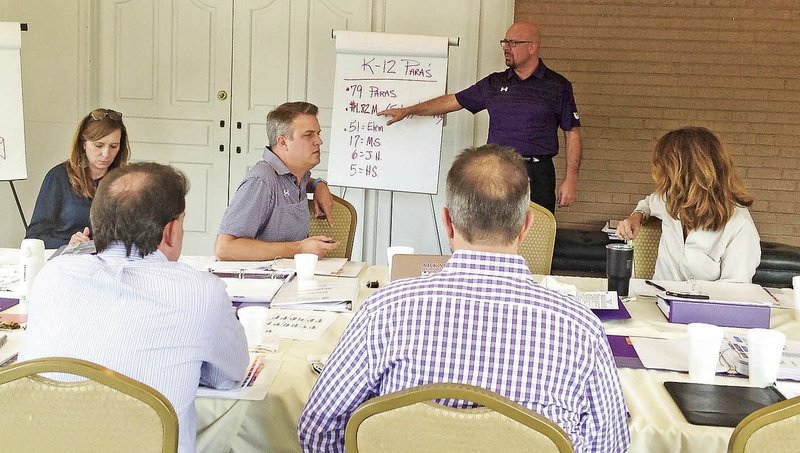FAYETTEVILLE -- The School Board spent much of a retreat meeting Friday identifying potential areas for improvement within the School District.
Administrators will take the board's input and convert it into goals addressing the district's shortcomings, said Superintendent Matthew Wendt.
Meeting continued
The Fayetteville School Board will continue its retreat meeting at 8:30 a.m. today at the Fayetteville Country Club.
Source: Staff report
Data show the district is doing a great job with many students, but there are specific groups of students -- particularly those who are economically disadvantaged -- that need more attention, Wendt said.
Megan Hurley, a board member, said she'd like to see more of the economically disadvantaged students and minority students enrolling in Advanced Placement courses. Board member Nika Waitsman suggested all students should be tested for the gifted and talented program.
Susan Heil, a board member, called for greater emphasis on the needs of the individual student.
"We have kids that need to be going to college," Heil said. "We never asked, they've never thought about it, and they don't know what their goal is."
Data indicate 33 percent of Fayetteville's students who qualify for free and reduced-price lunches scored proficient or advanced on the ACT Aspire reading tests and 43 percent did the same on math tests. The general population scored 69 percent and 73 percent proficient or advanced on reading and math, respectively.
Board members talked about closing the gap between the subgroup of students and the general population by as much as 3 percent per year over the next five years.
The board's discussion turned to the role of paraprofessional educators. Paraprofessionals often work one-on-one or in small groups with those students who are struggling the most in the classroom, Wendt said.
Wendt posed this question to the board, one he said came from a district employee: If Fayetteville has the best teachers in the state, why is the district putting these struggling students with paraprofessionals?
"How much money do you spend, and how many (paraprofessionals) do you get when maybe you should be hiring a classroom teacher?" Wendt said. "That's a cultural shift, and I don't have an answer to that."
More classroom teachers would result in fewer students per classroom. The district employs 79 paraprofessionals at a cost of $1.82 million. Nearly two-thirds of them are used at the elementary level, according to Wendt.
Paraprofessionals cover numerous duties, including lunch and recess supervision, said Steven Weber, associate superintendent for teaching and learning.
Wendt also presented a list of items needing attention in the district and asked board members to help prioritize those for him.
"Because we can't focus on 50," he said. "But what if we focused on 15, or 12, or 20 or 10. Which ones would they be," he said.
The district, for example, is looking at creating a more technologically advanced system for monitoring the status of its heating and air conditioning systems.
Also high on the district's to-do list this school year is finding a high school principal. Wendt said the position will be officially posted in December. He hopes to have a candidate chosen by the end of February.
A vacancy in the high school principal's position was created when Chad Scott was promoted to be the district's executive director of student services. Steve Jacoby, who served as principal from 2010 to 2015, returned to the principal's job in July on an interim basis.
NW News on 09/30/2017

